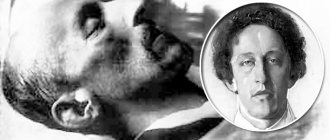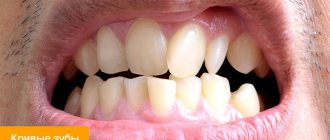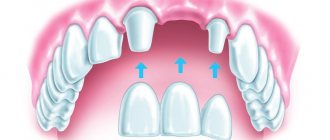Most people are not even aware that they have bad breath. Due to the structural features of the human nasopharynx and oral cavity, it is almost impossible to independently assess the freshness of breath. Since a person cannot smell his breath, its freshness can only be assessed by the reaction of others.
Bad breath can have one or more causes. It is important to determine whether bad breath is your constant companion or a temporary phenomenon.
The cause of temporary bad breath may be the consumption of certain foods. Usually, exotic spicy dishes, fatty sauces, onions, garlic, etc. have a negative effect on breathing. Thus, you can get rid of the smell simply by brushing your teeth. By performing regular oral hygiene after meals, you can completely eliminate the possibility of an unpleasant odor. If the appearance of bad breath is not associated with food consumption, there are several main reasons for its occurrence.
Where does bad breath come from after quitting smoking?
Bad breath, or, in other words, halitosis, in the case of people who have given up smoking, appears due to dysbiosis of the oral cavity. After an abrupt cessation of the intake of nicotine, hydrocyanic acid and tars, a restructuring of all metabolic processes occurs, including changes in the functioning of the gastrointestinal tract, and the oral cavity, intestines and respiratory tract begin to be populated by beneficial bacteria, while harmful microflora die. This process lasts no more than a few weeks and, with the right lifestyle, goes away without a trace.
Considering that smoking and healthy teeth are not compatible, it is not difficult to understand that an unpleasant odor can also be an alarming signal that requires a visit to the dentist. By settling on the surface of the teeth, tobacco tar destroys the enamel, causing caries and periodontal disease, the manifestation of which, in fact, is halitosis.
An unpleasant odor is also emitted by sputum secreted from the lungs and bronchi, which will create discomfort until the respiratory tract is completely cleared. And finally, in those who quit smoking, bad breath is explained by increased consumption of sweets as an alternative to cigarettes, which causes active breakdown of protein in the oral cavity.
Top 5 Causes of Bad Breath
Frequent communications with other people are an integral part of modern life. While bad breath can cause “forced silence.” How to avoid becoming an introvert against your will? And where to look for the cause of the trouble?
1. Insufficient hygiene and dental diseases
Food debris on teeth and gums provides food for oral bacteria. And the “waste” of such a diet becomes volatile compounds (ammonia, hydrogen sulfide and others), a large concentration of which is felt as an unpleasant odor.
In addition, such conditions contribute to the proliferation of pathogenic flora, which:
- firstly, it disrupts the pH of the oral cavity (due to bacterial waste products) and promotes demineralization of enamel and tooth tissue itself;
- and secondly, it increases the concentration of volatile substances in the oral cavity and contributes to the appearance of an unpleasant odor.
Thus, both improper hygiene and excess bacteria and signs of inflammation in gum disease, even with good hygiene, may be to blame for the appearance of a “problematic” odor.
In the first case, normal hygiene procedures twice a day, as well as rinsing after meals during the day, are sufficient to eliminate the problem. And in the second, the solution obviously requires the participation of a dentist.
Dry oral mucosa
This phenomenon often occurs while taking certain medications and is caused by insufficient saliva production.
In this case, the cleansing properties of saliva practically disappear, which contributes to the “accumulation” of food debris in the oral cavity and their “decomposition”, and also significantly “makes life easier” for bacteria.
Chronic diseases of the respiratory system
Chronic tonsillitis, pharyngitis, and sinusitis are a reliable source of excessive growth of bacteria in the oral cavity. Here we are most often talking about staphylococci and streptococci, which have pronounced pathogenic properties.
An unpleasant odor can also appear with purulent diseases of the bronchi and lungs, as well as with tumors at the stage of destruction. In this case, the smell from the mouth often becomes putrid in nature, and the cough is accompanied by copious sputum production.
Digestive system diseases
“Stomach” odors are often sour (with normal and high acidity) or “rotten” in nature (with low acidity), and appear under the following conditions:
- reflux of stomach contents back into the esophagus (reflux),
- narrowing of the gastric outlet (pyloric stenosis),
- the presence of ulcerative and oncological processes in the stomach or duodenum.
The smell can also be associated with liver damage, and then it has a characteristic “liver” tint.
Severe metabolic disorders
We are talking primarily about diabetes mellitus and its severe complication – ketoacidosis. The smell from the mouth in which case resembles “acetone”, and the condition itself can be fatal.
How to find the reason
1. You can confirm the “microbial” origin of bad breath by inoculating a swab from the throat and nose. The study will not only “show” the quantity and quality of microorganisms, but will also allow you to select an effective antibacterial drug, if necessary.
Culture is also relevant for sputum, if it is separated.
And also, in any case, an examination by a dentist and an ENT doctor is recommended.
2. It is quite difficult to check the condition of the stomach and duodenum using laboratory methods, therefore, if a “gastric” origin of the odor is suspected, a consultation with a gastroenterologist and FGDS is recommended.
3. The liver is one of the most multifunctional organs, so it is not surprising that many people experience its damage at a young age.
You can check the digestive function of the organ using a blood test for liver enzymes (ALT, AST), bilirubin, alkaline phosphatase and gamma-GT, both individually and in the format of the Liver Examination complex. Base".
4. A blood test for glucose levels and glycated hemoglobin (average level over the last 3 months) is “meant” to control the risk of diabetes.
Possible consequences
Bad breath is not only an annoying phenomenon, but also an alarming symptom of a number of serious diseases. To rule out their presence, you should definitely consult a doctor, take a comprehensive blood test and undergo a full examination by specialized specialists.
If you ignore halitosis, artificially masking its presence with menthol aerosol and other tricks, it is easy not to notice how an ailment that could be defeated in no time or even prevented will go into a chronic stage and become a companion for life. In addition, aesthetic dentistry is not cheap at all, and purchasing implants instead of your own, healthy teeth is an extremely expensive and dubious pleasure.
Myths about the benefits of nicotine or Still worth quitting
To smoke or not to smoke
- this choice in the modern world still remains a personal matter for everyone. However, recently, smoking patients have been increasingly restricted in their rights: bans on smoking in public places are being introduced, cigarette packs are “decorated” with scary pictures, and in some countries ideas are being seriously discussed to ban the sale of cigarettes to people born after a certain year. In response, smokers appeal to research data on the positive effects of nicotine. What is this - a scientific revolution or simple self-deception?
The approach to limiting the spread of tobacco products and smoking is absolutely logical: according to WHO, globally, tobacco kills about 6 million users and former tobacco users every year, and the economy suffers losses of more than half a trillion dollars. What’s even sadder is that non-smokers who are exposed to second-hand smoke die – more than 890,000 such cases occur annually. According to WHO forecasts, if the situation does not change, tobacco will kill up to one billion people this century, because nicotine addiction is one of the main factors risk of developing a range of chronic diseases, including cancer, lung disease and cardiovascular disease.
However, recently there has been an increasing consensus that although nicotine is highly addictive, it can be beneficial for the body. Are there any compelling arguments in favor of this point of view?
Various psychopharmacological studies of nicotine and tobacco have emerged since the last third of the twentieth century - driven by the need to understand the role nicotine plays in tobacco use, to categorize nicotine as a drug of abuse, to develop a pharmacological basis for the treatment of tobacco dependence, and to explore the potential of nicotine for the treatment or prevention of various disorders (for example, Alzheimer's disease, hyperactivity disorder, attention deficit disorder and other diseases).
In particular, studies have been conducted on the effect of nicotine on the cognitive functions of the human brain. A study that included patients with Alzheimer's disease found that nicotine has multifunctional properties, including promotion of procognitive effects in humans, rodents and primates and neuroprotective effects, but its use as a therapeutic agent is limited due to already known side effects on the cardiovascular system and other negative consequences on the body. Research in this direction continues, in particular, the possibilities of the nicotine metabolite, cotinine, are being analyzed.
is known to affect the brain
as well as the most important neurotransmitter - acetycholine: it causes the brain to produce “hormones of joy” - dopamine and serotonin. Since a deficiency of these hormones leads to depression, a group of scientists made the logical assumption that this disease could be treated with nicotine, and even conducted relevant studies on humans. They have shown that low doses of nicotine contained in nicotine patches can have an antidepressant effect. However, other studies suggest the opposite: nicotine patches produced only short-term improvements in patients suffering from depression, with few side effects. Due to the high health risks, the patches have not been recommended for clinical use in this disease.
It is obvious that pharmaceutical research into the properties of nicotine will continue, and perhaps in the future, on their basis, it will be possible to develop drugs for the treatment of certain ailments. However, today there is no work indicating that nicotine will benefit the body of a healthy person in the medium and long term.
There are plenty of facts in favor of the destructive effects of smoking on healthy people: in smoking patients, the condition of the skin worsens - the turgor decreases, the skin looks drier, takes on an unhealthy shade, and wrinkles appear earlier. Teeth suffer - tooth enamel cracks, gums are affected, tobacco tar is deposited on them, which gives the teeth a characteristic yellow color. People around them feel an unpleasant odor from their mouth, fingers, hair and clothes, and the smoking patient himself becomes less able to distinguish tastes and smells over time.
But while these shortcomings can still be accepted, it’s hard to argue with the fact that smoking is the leading preventable cause of death worldwide. Smoking increases the risks of heart attacks, strokes, vascular atherosclerosis, hypertension, arrhythmia, and is also responsible for the occurrence of 15 types of cancer. Smoking also has a negative effect on the condition of the blood and tissues, and contributes to the narrowing of peripheral blood vessels.
Research shows that most smoking patients who are aware of the dangers of tobacco want to quit smoking. The difficulty of overcoming tobacco addiction is associated, first of all, with nicotine, which in fact turns out to be a very strong drug, causing regular and uncontrolled use and pathological craving, and in the case of attempts to give up the bad habit, provoking withdrawal syndrome, accompanied by growing anxiety, irritability, anxiety, etc.
WHO experts believe that consultations with specialists and modern medications can more than double the likelihood that attempts to overcome addiction will be successful. One of the options for medical assistance is the use of an innovative drug for the treatment of nicotine addiction without nicotine (for example, varenicline, TN Champix).
It's never too late to quit smoking, but the sooner a person gives up this addiction, the more years of life he can gain from nicotine.
But you need to quit smoking no later than 40–45 years old, says Meredith Duncan from Vanderbilt University in Nashville (USA). According to her, this is because the cardiovascular system takes 15 years to fully recover. Duncan noted that five years after quitting a habit, a person’s health “visibly improves,” and the chances of having a heart attack or stroke are reduced by 38%.
However, compared with the average person, ex-smokers are still more likely to develop these types of health problems for 16 years. “That’s why you need to quit smoking right now,” Duncan said.
This article is for informational purposes only.
Innovative Technologies LLC thanks you for taking the time to read this information.
How to get rid of unpleasant odor after smoking
There is only one way to get rid of an unpleasant odor after quitting smoking - an integrated approach, including cleansing the lungs and bronchi, dental treatment and normalizing the functioning of the stomach.
So, first of all, it is necessary to do inhalations with disinfectant compounds that help remove from the body the layer of tar and other products of tobacco combustion that have settled on the mucous membranes.
Secondly, in the first time after quitting cigarettes, it is important to observe oral hygiene more carefully, not forgetting to brush your teeth with a good paste with a high calcium content after every meal and even drink.
Thirdly, you should be more selective in matters of nutrition, giving preference to vegetables and fruits, and categorically refusing hot, spicy foods and saturated sugars. And, to complete the set of measures, those who quit smoking need to gargle and gargle with herbal solutions.
Conventional rinses will not work here, since in this case it is important not just to deodorize the mouth, but to effectively disinfect it. Dentists recommend that anyone who, having given up smoking, fears for their teeth and suffers from bad breath, during the first years after quitting tobacco, should visit a doctor for preventive purposes once every two to three months, instead of the usual twice a year.
The effect of tobacco smoke on the oral organs, or another reason to quit smoking
06.11.2018
Smoking is a common bad habit, despite public beliefs about its harmful effects on all organs and systems of the body. Smoking causes a huge number of diseases, such as: oncology, emphysema, myocardial infarction, stroke, angina pectoris, stomach ulcers, etc. The list of diseases caused by smoking can be continued for a very long time. In our article, we will tell you what exactly happens to the organs of the oral cavity during systematic contact with tobacco smoke.
The oral cavity is primarily exposed to harmful substances contained in cigarettes. There are more than 4,000 of them! For this reason, the negative consequences of smoking immediately manifest themselves in the oral cavity.
It is possible to distinguish between the aesthetic consequences of smoking and the consequences that cause diseases of the oral cavity.
Aesthetic ones include the formation of dark brown plaque on the surface of the teeth, as well as bad breath.
Plaque on teeth is formed due to the deposition of cadmium sulfate, which is a combustion product, on the teeth. And when interacting with salivary proteins, it actively adheres to the surface of tooth enamel. At the same time, the high temperature, which also occurs in the oral cavity when smoking, finally seals these dental plaques, thereby depriving the patient of the opportunity to clean the plaque on his own.
The most common location is the inner surface of the mandibular incisors; where the exit of the duct of the sublingual salivary gland is located.
However, the more a person smokes and the lower the level of hygiene, the greater the area of distribution of dark plaque, up to the complete overlap of the crown part of the tooth.
An unpleasant odor (halitosis) is also caused by the accumulation of combustion products on the root of the tongue, soft plaque and on the surface of the mucous membranes. It should be noted that these conditions are quite favorable for specific gas-forming bacteria, the waste products of which are sulfur compounds. All this together leads to the formation of bad breath. Smoking patients should undergo professional oral hygiene every 3-4 months, always performing remineralizing procedures.
As for the consequences of smoking causing oral diseases , it should be noted that this is a much more serious problem. The thing is that the mucous membrane of the oral cavity is lined with very delicate and vulnerable epithelium. And systematic smoking has a traumatic effect on the mucous membrane. This is due precisely to those toxic substances and resins that were mentioned earlier, as well as to exposure to high temperatures.
The most common diseases of the oral cavity, the formation of which is associated with smoking: gingivitis, periodontitis.
Tobacco smoke has a toxic effect on the ligaments of the tooth. First, gingivitis (inflammation of the gums) develops, and then periodontitis. Patients usually come in with significant bone defects, when noticeable tooth mobility appears. This is due to the fact that the substances included in tobacco products cause spasm of peripheral vessels, thereby disrupting the normal trophism of tissues, which causes inflammation. As a rule, it proceeds without pain and bleeding (this is due to the same vascular spasm). This is a common cause of tooth loss.
- Smoker's stomatitis.
This diagnosis is usually made to patients with a newly acquired habit. The source of inflammation is usually localized in the palate, since it is the palate that is exposed to hot toxic smoke. Stomatitis is accompanied by pain and burning sensations in the area of the damaged area.
- Xerostomia.
Characterized by dry mouth associated with insufficient salivation. Xerostomia is usually observed in patients with a smoking history of more than 5 years. Dry mouth is associated with the fact that tobacco smoke spasms and blocks the work of small salivary glands throughout the oral cavity, and therefore a sufficient amount of saliva ceases to be produced. Patients complain of a burning sensation in the mouth, discomfort when eating, and dry mucous membranes. With xerostomia, caries begins to progress completely on all teeth, as the pH balance of the oral cavity is disturbed and an acidic environment is maintained.
- Melanosis of the mucous membrane.
This disease manifests itself in the form of dark brown spots on the gums and on the mucous membrane of the cheeks and palate. Complaints are often only aesthetic, but in rare cases these spots can cause discomfort in the form of severe itching; cases of malignancy (malignant course) of spots, with a course similar to melanoma, have also been described.
Further, diseases of the oral cavity can be divided into two categories: accompanied by the formation of defects in the mucous membrane (minus tissue): erosions and ulcers; or the formation of plus tissue. In the second case, such diagnoses as leukoplakia (growth of the keratinized layer of the mucous membrane), cancer of the lip, tongue, and larynx are possible.
It is worth noting that long-lasting ulcers, erosions, as well as leukoplakia, according to the classification of diseases, belong to precancerous diseases, which at any time can transform into a malignant form.
Treatment of all the above-mentioned diseases, without eliminating the cause that caused the disease (smoking), will be ineffective, if not bring no results at all. If cancer is diagnosed, then treatment consists of surgery, excision of the affected tissue and chemotherapy. All this is accompanied by very strong stress and a deterioration in the patient’s quality of life.
Prevention of these diseases is very simple - you need to completely stop smoking.
Summarizing all of the above, a conclusion suggests itself, from which it follows that the price of smoking is too high, and you should not expose yourself to unjustified risks.
By the way, today is a great day to quit smoking!
What not to do
Often those who quit smoking try to mask their bad breath rather than fight it. This behavior not only aggravates the situation, but is also extremely dangerous. Excessive consumption of candies and chewing gum will lead to the loss of existing fillings in the teeth and will cause the development of caries.
By ignoring the problem, you can face the social problem of a lack of communication and forced isolation, and, by returning to an addiction, you can even make the most serious mistake in your life, nullifying all the efforts made to defeat addiction. It’s easy to get rid of bad breath if you approach the problem thoroughly and fight not its manifestation, but the true causes.








